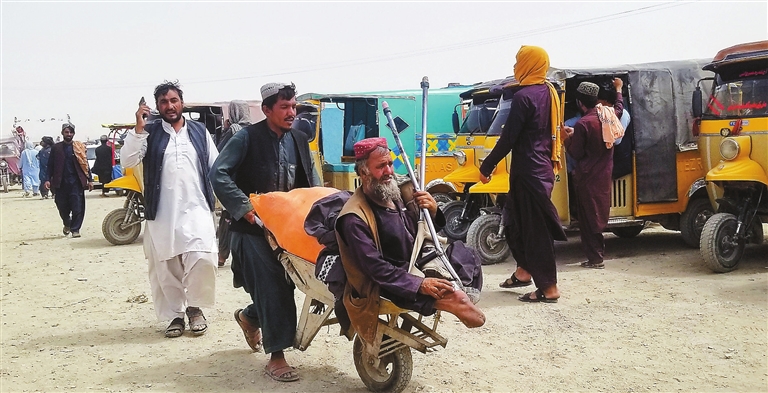
FORCED to leave his home in Afghanistan’s northern Kunduz a couple of days ago after Taliban fighters captured it, an aged man lives in a dusty open park in the northern edge of Kabul city. The homeless man, who declined to be identified, attributed his miseries to the irresponsible troop withdrawal by the United States that has added to the suffering of ordinary Afghans. Furious and feeling lost, he cannot help but ask: Why did the United States leave the country without bringing about peace and stability here? Why did it invade Afghanistan in the first place? Miseries of the displaced The displaced man is head of an eight-member family. His life has been turned upside down overnight as fighting and violence have further intensified in Afghanistan. “I had everything in Kunduz. I had a prosperous and happy life in Kunduz. But today, here, I have nothing. I don’t even have a tent to live in and spend my day and night,” he said. The man harshly denounced the United States for leaving behind a mess in his country. “Under the pretext of diminishing terrorists, bringing about peace, developing Afghanistan, empowering women in society and ensuring human rights, the United States invaded Afghanistan,” he said. “But all in vain.” “Terrorists are active, fighting continues, human rights are trampled on, people are killed brutally every day, and women’s rights are a joke,” he said. What he has experienced is a microcosm of the numerous displaced people in the war-torn country. The U.N. Office for the Coordination of Humanitarian Affairs announced last Wednesday that conflicts in different parts of Afghanistan in the past weeks have driven tens of thousands of people from their homes. The office said they are part of the nearly 390,000 people displaced by hostilities this year, with a massive spike since May. Many of the displaced fled to Kabul and other large cities. More than 5,800 internally displaced persons arriving in Kabul between July 1 and Aug. 5 need food, household items, water and sanitation support and other assistance, the U.N. said. Samihullah, another displaced man, told Xinhua he left his hometown in Yangi Qala of Takhar province three days ago to escape the war, but he and his family have not received any humanitarian assistance so far. Hundreds of families fled their homes in his neighborhood, he said. A humanitarian catastrophe A more complex and challenging humanitarian catastrophe is shaping up in Afghanistan after the United States started hastily withdrawing its troops from the country, leading to an immediate conflict escalation and a rapid deterioration of security. Relief workers in Afghanistan last Thursday were determining the needs of 18.4 million people out of a population of close to 40 million as fighting spreads across the country. According to the International Committee of the Red Cross, 4,042 weapon-wounded patients have been treated at its 15 supported health facilities across Afghanistan since the beginning of August. The situation is worsening. Homes, hospitals, shops, bridges and other infrastructure have been destroyed amid heavy clashes between the Taliban and government forces. As a result of the conflict in the past month, more than 1,000 civilians have been killed. The U.N. also confirmed last Monday that over 27 children were killed in three days. The conflict “has accelerated much faster than we all anticipated and the situation has all the hallmarks of a humanitarian catastrophe,” World Food Program spokesperson Tomson Phiri said. Without a de-escalation of violence, Shabia Mantoo, a spokesperson for the U.N. refugee agency, said Afghanistan is on track to have the highest number of documented civilian casualties in a single year since the U.N. began keeping records in 2009. Mess left behind Currently, many Afghan cities and about half the country’s 34 provinces in recent weeks have seen heavy battles and street fighting between Afghan forces and Taliban militants. The Taliban have entered Afghanistan’s capital Kabul and taken over the presidential palace after former Afghan President Mohammad Ashraf Ghani fled the country, reportedly to Tajikistan, on Sunday. Earlier this month, Ghani blamed the speedy withdrawal of U.S.-led troops for the worsening violence in his country. As multiple cities have fallen to the Taliban, U.S. President Joe Biden said last week that Afghan troops must defend the country themselves. Biden had ordered the U.S. military to end its mission in Afghanistan by Aug. 31, days ahead of his original Sept. 11 deadline. The U.S. Central Command said over 95 percent of the drawdown had been completed. At the invitation of Qatar, special envoys and representatives from China, Russia, Pakistan, the United States and the United Nations, as well as other regional countries and international organizations, have gathered in Doha since Aug. 10 to hold talks over the situation in Afghanistan. Last Thursday night, representatives issued a joint statement, calling on the Afghan warring parties to expedite the peace process, and reach a political settlement and comprehensive cease-fire as quickly as possible. The participants said they would not recognize any government in Afghanistan that is forcibly imposed and are much concerned about the ongoing violence, large numbers of civilian casualties, allegations of human rights violations, and destruction of infrastructure. They pledged to provide assistance to the reconstruction process once a viable political settlement is reached between the two sides. “What we are doing around the clock is seeking to find a way out of this,” U.S. State Department spokesperson Ned Price said. (SD-Xinhua) | 
